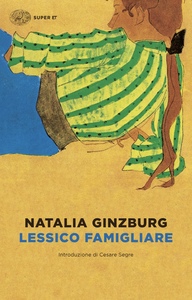You need to sign in or sign up before continuing.
Take a photo of a barcode or cover
informative
inspiring
fast-paced
As I grow older, I notice in myself the tendency to record things from the past, to put memories on paper, to look at old photos and keep them. Not out of nostalgia (at least I think so), but out of an undefined fear that something of value would be lost. That value is of course primarily for myself, but also the feeling that the ‘little life’ I have led, the environment in which I grew up, and the environment in which I later built my life, nevertheless have a certain ‘universal’ value, say something about human life in general. That sounds pretentious, I know, but doesn’t that tie in with the individual view in which and to which we are all riveted?
I suspect that something similar drove the Italian writer Natalia Ginzburg (1916-1991) to put this lexicon on paper and publish it. The title does indeed speak of lexicon, and not chronicle or autobiography, and that is telling. It is striking that this book is made up of mostly short sentences spoken by her family members and acquaintances, typical turns of phrase that characterize a person, a milieu, or a time. That immediately indicates the antiquarian quality of this book. Because it is striking how ‘impersonal’ this book seems: Ginzburg describes and records, and hardly shows any emotion. Even the death of her first husband, Leone Ginzburg, in a prison of Mussolini’s fascists, is simply mentioned, almost in passing. We hardly hear anything about Natalia herself, and the development she went through. And with the exception of a few passages, she does not devote a single letter to philosophical, political or literary reflections.
No, instead, this book is a coming and going of characters, with the frenzy father (eventually becoming a bit of a caricature of himself) and the constantly mothering mother as pivots, and around them brothers and sisters, uncles and aunts, in-laws, acquaintances and friends, … sharply drawn (especially through the short sentences they utter), but absorbed in sometimes banal actions and discussions.
In a sense, but not entirely, you can compare this with the much later “Les années”/The Years by Nobel Prize winner Annie Ernaux, which describes her own life and the successive periods of time from an impersonal point of view. I must say that Ginzburg's book, despite the fact that she herself remains largely out of the picture, still feels a bit more personal. It’s a warm, sympathetic reconstruction of a special (although essentially petty bourgeois) family in a special era (especially the dictatorship of Mussolini). In that regard, this collection certainly has universal value.
lighthearted
reflective
fast-paced
funny
medium-paced
reflective
slow-paced
mi è piaciuto molto immergermi nelle dinamiche di questa famiglia e del suo linguaggio
informative
lighthearted
slow-paced
dark
emotional
funny
reflective
sad
medium-paced
dark
funny
reflective
sad
slow-paced
medium-paced


